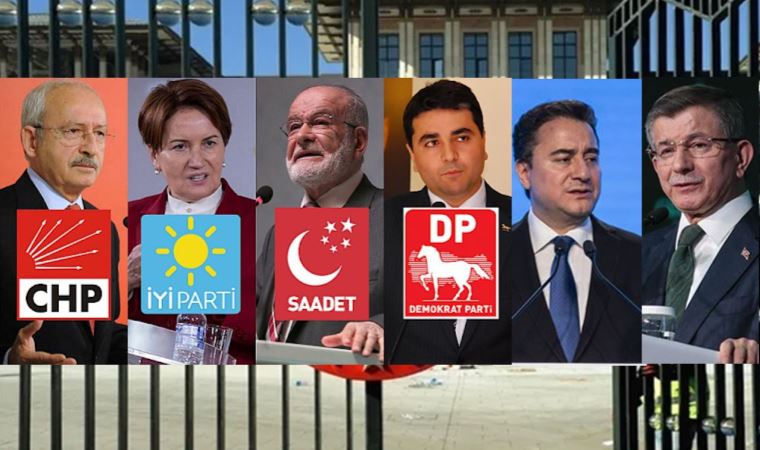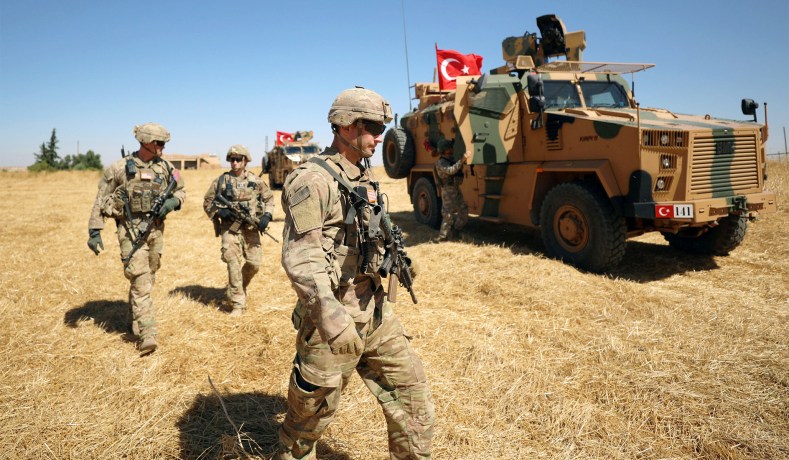Turkey’s 6 opposition parties agree on principles to make up an election declaration

The third meeting of the six opposition parties at the level of deputy heads of state to draft the declaration of principles took place in the Parliament. The resulting text is supposed to serve as a roadmap for the six opposition parties to follow prior to election and in case they came to power. In fact, this text could also be referred to as “the election declaration of the six parties”.
After three meetings, the final text has not reached the stage where it can be submitted to the presidents, but many issues agreed on by 6 parties, have been made clear. It can be said that the general framework of the common text has emerged.
The articles on which the six parties have reached a consensus are as follows:
1-NEUTRAL President: The President will not be a member of a political party. His/her position will be neutral. If a party leader is elected as the president, this person will resign from his/her party. The president will not be able to be the chairman or a member of a party at the same time, since he/she will represent the state and the nation. The authority of the president will be representative (symbolic). The president will not be able to choose those who will be appointed to the Board of Judges and Prosecutors and high judicial bodies. Appointments to these bodies will be made by election by a large number of members of the judiciary. The president will either not be able to appoint at all or he/she will be able to appoint 1 or two members.
2-POWERFUL Parliament: The powers of the Parliament, the balance, the supervisory mechanisms will be strengthened. The Prime Minister and the ministers will be elected in the Assembly and will be responsible to the Assembly. A vote of confidence in the government will be made easier and a vote of no confidence will be made difficult. When the positive votes outnumber the negative votes, the government will have received a vote of confidence. However, an absolute majority will be sought in the vote of no confidence. An absolute majority will decide who will become prime minister before bringing down the government. The president will have to appoint the name determined by an absolute majority, as prime minister. This system, known as a constructive or constituent vote of no confidence, is being implemented in Germany and Spain. All six opposition parties are working on this system and are looking at it positively.
3-Impartial and Independent Judiciary: Another issue that the six opposition parties have agreed on is the creation of an impartial and independent judiciary. The judiciary will be restructured on the basis of merit. The majority of the members of the supreme judicial council will be determined by the election of members of the judiciary. The President and the Parliament may be given the opportunity to elect members to a degree that does not affect the majority in the delegations. But the majority will be chosen by professionals (in the sector). HSK (Court of Judges and Prosecutors) will split into two. The Supreme Council of Judges and the Supreme Council of Prosecutors will be established.
4-YSK (Supreme Election Council): In order to ensure the right to choose and be elected, as well as election security, the Supreme Election Council will be reconfigured on its own. The right to apply to the Constitutional Court against the decisions of the Supreme Election Council will be granted.
5-FREE Media: Measures will be taken to liberate the media. Decisions will be made to make the media structure, which has become an extension of power today, independent and free. The RTUK (Radio Television Higher Board) and the Press Advertising Agency will be restructured. RTUK will not be able to take criminal decisions on televisions, it will only be able to apply to the court and the courts will make the decision. These two institutions will be removed from being a means of punishing the free media of the government. The RTUK and the Press Advertising Agency will be created from impartial and expert people.
6-Law on Political Morality: The first law to be submitted to the Parliament in the change of power will be the “Law on Political Morality”. The Strengthened Parliament will investigate allegations of nepotism, unfair enrichment, unfair allocation of resources, corruption, influence peddling, commissions, bribes and the like in violation of the law in the use of treasury resources.
7-Powers of the “Court of Accounts”: In the change of power, the powers and supervision area of the Court of Accounts which is responsible for auditing the income, expenses and assets of the state on behalf of the Parliament, will be expanded.
8-Constitutional Amendment: Six opposition parties will prepare a proposal for a constitutional amendment based on these principles after the election. Changes to the constitution that should be made during the transition to a strengthened parliamentary system will be determined by a broad board with representatives of institutions such as political parties, universities, bar associations, non-governmental organizations, trade unions.
9-The Kurdish Problem: One issue on which the six opposition parties are united in their approach is the Kurdish problem. All six parties agree that the Parliament is the address for solving all problems. In this regard, the Kurdish problem, like the problem of all segments, will be resolved in the Parliament and within the unitary structure.
10- Transparent Management: A transparent management approach will be applied in the change of power. Accountability will be fundamental, as the requirement of democracy. Parliamentary, judicial and media supervision will be made operational.
The delegation consisting of deputy heads of six opposition parties will finalize its work and prepare a 1-1.5 page text covering these principles and submit it for the approval of the party leaders. The leaders will decide which principles will be included in this short text. However, even if the agreed issues are not included in the short text, they will be included in the detailed report.
According to a Vice President who participated in these studies on behalf of the CHP, the text that will appear will be a mindset change text and will form the basis for subsequent studies, including a constitutional amendment.





